|
|
|
Sort Order |
|
|
|
Items / Page
|
|
|
|
|
|
|
| Srl | Item |
| 1 |
ID:
164043
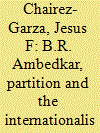

|
|
|
|
|
| Summary/Abstract |
This article analyses the way in which B.R. Ambedkar attempted to internationalise the problem of untouchability in the years prior to Partition. The move towards the international was an attempt to secure a political space for Dalits as a consequence of the Muslim League’s demand for Pakistan. Unable to reach an agreement with the likes of Gandhi and Jinnah, Ambedkar looked beyond India for support. His plight gained the attention of disparate people, including Winston Churchill, Jan Smuts and the members of the Indian Conciliation Group. By exploring these events, this article seeks to rescale the history of untouchability and Partition.
|
|
|
|
|
|
|
|
|
|
|
|
|
|
|
|
| 2 |
ID:
164047


|
|
|
|
|
| Summary/Abstract |
This paper makes interventions in our understanding of the histories of Partition. Rather than treating 1947 as a moment of temporal rupture, it argues that processes that were set in motion during the two World Wars persisted into the post-colonial period and proved critical in determining the shape of contemporary Indian urbanism. While the post-Partition Indian state, obsessed with planning capital spaces, used rehabilitation as an instrument to gain control over the city, this paper argues that it was during the early 1940s, and particularly during World War II, that we can trace the genealogy of post-colonial urban governance. It will assess migration, urban planning, popular protest, war-time controls, and the political economy of land use during the 1940s in Delhi, which in many ways shaped how the city later responded to Partition.
|
|
|
|
|
|
|
|
|
|
|
|
|
|
|
|
| 3 |
ID:
164046
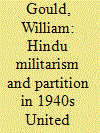

|
|
|
|
|
| Summary/Abstract |
The United Provinces and its urban centres were not in Partition’s immediate hinterland or a key subject of its high politics, but were pivotal, this paper argues, at an alternative scale of political mobilisation around volunteer movements. Central to this process were the spatial dynamics of organised violence in the early to mid 1940s, not least because of how pivotal organised killings were by 1947. By exploring the provincial patterns of the development of volunteer movements, their spatial and their inter-communal associations over time, and their ideological content (using a case study focussed on P.D. Tandon), the article argues that there were longer-term associations between organised volunteer activities and instances of pre-Partition violence that foreshadowed the large-scale attacks of the summer of 1947. This potentially affects the way historians read Partition violence as a specific ‘moment’ of communal antagonism and the significance of these movements’ ideologies of violence to India’s long Partition.
|
|
|
|
|
|
|
|
|
|
|
|
|
|
|
|
| 4 |
ID:
164038
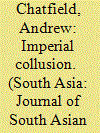

|
|
|
|
|
| Summary/Abstract |
During and immediately after World War I, Indian nationalism became subsumed into the overall American governmental efforts to cripple the activism of alleged subversives, radicals and anarchists. Indian nationalism was cast in a particularly negative light in the United States after British and American officials uncovered the Indo-German conspiracy of 1915. Using primary sources from American and British archives, I argue that through this ‘imperial collusion’ with the British, the United States spurned its Indian population and plainly let it be known that it would not support anti-colonialist independence movements. There were, however, American supporters of Indian nationalism in the United States who voiced their condemnation of British imperialism and disdain for American government repression and racism towards its Indian population. This article adds depth to South Asian studies through its transnational approach to anti-imperialism and anti-colonialism by revealing the shared solidarity among Indian and American anti-imperialists as they combatted the seemingly ubiquitous forces of the British and American empires from 1917 to 1920.
|
|
|
|
|
|
|
|
|
|
|
|
|
|
|
|
| 5 |
ID:
164039
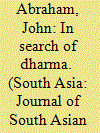

|
|
|
|
|
| Summary/Abstract |
This article examines the roots of a Hindu nationalist economic agenda. Beginning with a critical overview of Deendayal Upadhyaya’s economic manifesto, Integral Humanism (1965), it delineates the eclectic set of ideas drawn together by this early Hindu nationalist leader to formulate an alternative ethical and economic agenda from either centralised planning or its liberal critics. The paper then gauges the influence of Integral Humanism on two successive Hindu nationalist political parties. The analysis shows more discernable influence on the economic position of the Bharatiya Jana Sangh (1951–77) than on its successor, the Bharatiya Janata Party (from 1980). The conclusion offers some observations as to why this is the case, and outlines prospects for the economic future of India under a Hindu nationalist government.
|
|
|
|
|
|
|
|
|
|
|
|
|
|
|
|
| 6 |
ID:
164041
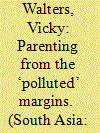

|
|
|
|
|
| Summary/Abstract |
Sanitation work is considered highly polluted in Hindu society and the stigma inflicted on sweepers and manual scavengers (safai karamcharis) extends to their children. This paper examines how safai karamcharis navigate parenting from the ‘polluted’ margins. It explores strategies adopted to protect children from stigma and explains how these strategies are temporal and partial. It also discusses the hope parents place on education for their children’s social mobility but how securing quality education is fraught with challenges, and that while education is necessary it is insufficient for the children of safai karamcharis to achieve social mobility and freedom from caste-based occupational rigidity.
|
|
|
|
|
|
|
|
|
|
|
|
|
|
|
|
| 7 |
ID:
164048
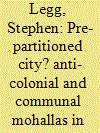

|
|
|
|
|
| Summary/Abstract |
This paper explores the mohallas of Delhi, sub-communities within the city, and asks whether Delhi was pre-partitioning before August 1947. It suggests that the mohalla was a site of political mobilisation that was systematically used by the Congress from the Civil Disobedience movement of 1930 onwards. During the early 1940s, communal voluntary associations like the Muslim League’s National Guard and the Rashtriya Swayamsevak Sangh attempted to establish representatives and training practices within mohallas. The paper concludes that the mohalla provided a space and a scale at which to view communal violence afresh, as one of the many ‘spaces before Partition’ that were reshaping (in) the 1940s.
|
|
|
|
|
|
|
|
|
|
|
|
|
|
|
|
| 8 |
ID:
164040
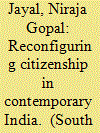

|
|
|
|
|
| Summary/Abstract |
In this paper the author revisits her book, Citizenship and Its Discontents: An Indian History (2013), to examine its central themes—status, rights and identity—in relation to political developments in India since 2014. The paper argues and provides evidence for, firstly, the greater consolidation of a jus sanguinis citizenship regime, with an attenuation of religion-neutral laws of citizenship; secondly, a shift from a rights-based conception of social citizenship to a contributory approach to welfare, now burdened with the requirement of a biometric identity; and, finally, the routinisation and normalisation of identitarian violence against Dalits and Muslims, rendering their citizenship even more precarious.
|
|
|
|
|
|
|
|
|
|
|
|
|
|
|
|
| 9 |
ID:
164045
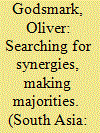

|
|
|
|
|
| Summary/Abstract |
This paper re-examines the demand for Pakistan as part of a wider ‘federal moment’ in India by addressing its connections with the contemporaneous calls for Samyukta Maharashtra in the context of the Cabinet Mission of spring/summer 1946. It highlights how the twinned processes of democratisation and provincialisation during the inter-war years informed these demands. Both Muslim and Maratha representatives looked to locate and create autonomous political spaces that would better secure their political representation. Their demands exemplified a shift away from a commensurative logic expressed through separate representation in the legislatures towards support for majority rule at the provincial level.
|
|
|
|
|
|
|
|
|
|
|
|
|
|
|
|
| 10 |
ID:
164049


|
|
|
|
|
| Summary/Abstract |
This paper examines the geographies of Partition through an analysis of the Punjab Boundary Commission hearings of July 1947. The paper asks: what happens when geographical expertise is transported from ‘the field’ to courtrooms and government offices? I argue that geography was transformed, and was managed and limited by the legal framework that judged evidence according to its own rules. Examining select records of the Punjab Boundary Commission, I argue that the courtroom created certain assumptions about the nature and role of evidence in boundary-making negotiations. Rather than applying evidence to create a workable boundary, evidence was put to work in often contradictory ways in order to lend competing political claims an air of geographical authority.
|
|
|
|
|
|
|
|
|
|
|
|
|
|
|
|
| 11 |
ID:
164042
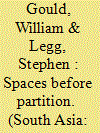

|
|
|
|
|
| Summary/Abstract |
This introduction frames a selection of papers that encourage a richer spatial understanding of the years before the Partition of India. The papers respond to two types of questions. One type is spatial (at what scale do we approach Partition? Through which spaces should we attempt to understand both micro and macro processes? Movements across what distances constituted Partition?). The second type is temporal (what timescales do we invoke when approaching Partition? Of what was it the endpoint? What sort of memories were invoked and made during India’s multiple partitions?). This introduction establishes the main trends in Partition historiography, tracked through the last two decennial anniversaries. It sketches out spatial analyses of Partition to date, regarding territory and displacement especially, but shows that much of this geographical interpretation has been implicit rather than explicit, and that most have begun with Partition. Whilst framing many of their arguments in twentieth-century colonial practice, and occasionally straying into the post-colonial, the papers in this special issue mostly focus on the 1930s–1940s at a range of scales (from the international, through the nation-state, to cities, mohallas and courtrooms). Collectively they make the argument that if Partition has a history, then it also has an historical geography. We hope these papers will help people read these histories and geographies with a finer spatial eye.
|
|
|
|
|
|
|
|
|
|
|
|
|
|
|
|
| 12 |
ID:
164044
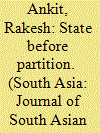

|
|
|
|
|
| Summary/Abstract |
This paper is a study of the Interim Government in British India, formed during the penultimate viceroyalty of Archibald Wavell, from September 1946 to March 1947. It tries to throw light on major and minor personalities and micro and macro processes at work in this improbable interlude and, thus, probes an overshadowed ministerial and bureaucratic set-up in the lead-up to Partition. This understudied set-up constituted yet another compelling ‘space before Partition’ which would continue to affect the Indian state after Partition. Simultaneously, the paper seeks to complicate the teleology and inevitability of Partition by showing this interim arrangement at work, which belied its name. Bringing together official texts and the personal interpretations of many participants, it approaches the period as liminal, albeit one with limitless possibilities at this juncture, of which what followed in 1947 was but one.
|
|
|
|
|
|
|
|
|
|
|
|
|
|
|
|
|
|
|
|
|